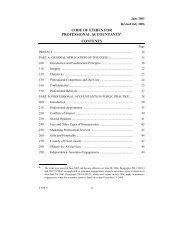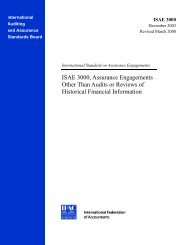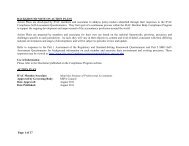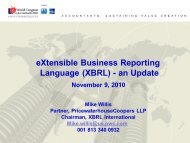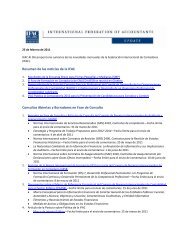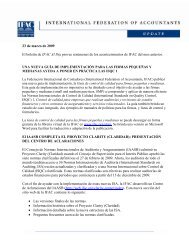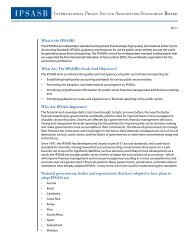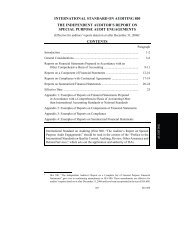ISRS 4410, “Engagements to Compile Financial Information”— - IFAC
ISRS 4410, “Engagements to Compile Financial Information”— - IFAC
ISRS 4410, “Engagements to Compile Financial Information”— - IFAC
You also want an ePaper? Increase the reach of your titles
YUMPU automatically turns print PDFs into web optimized ePapers that Google loves.
IAASB Main Agenda (December 2009) Agenda Item<br />
3-A<br />
Engagements <strong>to</strong> <strong>Compile</strong> <strong>Financial</strong> Information—Issues and IAASB Task<br />
Force Proposals<br />
I. Objective<br />
1. The objective of this Paper is <strong>to</strong> consider significant issues <strong>to</strong> be addressed in the revision<br />
of ISRE <strong>4410</strong> for engagements <strong>to</strong> compile financial information.<br />
II. Background<br />
June IAASB Meeting<br />
2. At its meeting in June 2009, the IAASB agreed that developing a revised standard on<br />
compilation of financial information is a priority.<br />
3. The IAASB also agreed that the revised standard should:<br />
• Be developed in tandem with the development of a revised standard on reviews of<br />
financial statements.<br />
• Clearly distinguish an engagement <strong>to</strong> compile financial information from an<br />
assurance engagement.<br />
• Clarify the objective of a compilation of financial information (and the practitioner’s<br />
objective <strong>to</strong> be achieved in undertaking a compilation).<br />
• Apply <strong>to</strong> compilation of financial information broadly, including financial statements<br />
prepared under all kinds of financial reporting frameworks (including fair<br />
presentation or compliance frameworks).<br />
• Address common aspects of performance of reviews and compilations on a consistent<br />
basis, as appropriate in the context of each type of service.<br />
• Guide practitioners in meeting the overarching ethical requirement set out in the<br />
<strong>IFAC</strong> Code of Ethics for Professional Accountants (<strong>IFAC</strong> Code), 1 that a practitioner<br />
may not be knowingly associated with information that is materially false or<br />
misleading.<br />
4. The IAASB also agreed that the Task Force should consider communications <strong>to</strong> promote<br />
practitioner and user awareness about compilations as services for entities that are exempt<br />
from an audit, including use of compilations in combinations of services designed <strong>to</strong> meet a<br />
variety of user needs. This aspect of the project is not discussed in this Paper.<br />
1 The revised version of the <strong>IFAC</strong> Code was issued in July 2009 and is effective from 1 January 2011.<br />
Prepared by: Joanne Moores (November 2009) Page 1 of 27
Engagements <strong>to</strong> <strong>Compile</strong> <strong>Financial</strong> Information—Issues and IAASB Task Force Proposals<br />
IAASB Main Agenda (December 2009)<br />
Inputs <strong>to</strong> this Paper<br />
5. The Task Force has drawn on a wide range of sources of information and inputs <strong>to</strong> identify<br />
and develop the issues identified in this Paper. A list of primary sources used is given in<br />
Appendix 1.<br />
III. Significant Issues<br />
Nature and Scope of Service(s) Practitioners Provide in Engagements <strong>to</strong> <strong>Compile</strong> <strong>Financial</strong><br />
Information<br />
Scope of the Revised Standard<br />
6. <strong>ISRS</strong> <strong>4410</strong>, paragraph 3, describes a compilation as use of “accounting expertise, as<br />
opposed <strong>to</strong> auditing expertise, <strong>to</strong> collect, classify and summarize financial information.” It<br />
further explains, “…this ordinarily entails reducing detailed data <strong>to</strong> a manageable and<br />
understandable form without a requirement <strong>to</strong> test the assertions underlying that<br />
information.”<br />
7. The IAASB Glossary of Terms2 (“the Glossary”) refers <strong>to</strong> the term “compilation” only in<br />
the context of the definition of “related services” referred <strong>to</strong> in the International<br />
Framework for Assurance Services (“the Assurance Framework”). 3 The term compilation<br />
is not defined either in the Glossary or in the extant engagement standard.<br />
8. The Task Force believes that, in line with the scope of the extant standard, the revised<br />
standard should be addressed <strong>to</strong> “financial information.” While professional accountants<br />
may be involved in compiling other subject matter information, including non-financial<br />
information, the expertise of professional accountants in public practice is directed<br />
primarily <strong>to</strong> activities that involve financial information.<br />
9. The term “financial information” is not defined in the Glossary or in other IAASB<br />
pronouncements. The Task Force considered whether the term should be defined, and came<br />
<strong>to</strong> the preliminary view that the ordinary meaning of the words is sufficient; a definition<br />
may not be needed. The meaning ascribed <strong>to</strong> “financial information” in the revised<br />
standard should extend <strong>to</strong> all types of financial information that a professional accountant<br />
in public practice might undertake <strong>to</strong> compile for a client. An attempt <strong>to</strong> define the term<br />
might unnecessarily restrict the application of the standard.<br />
10. Notwithstanding that the revised standard will be written in the context of financial<br />
information, the Task Force recognizes that the principles applied <strong>to</strong> compile financial<br />
information are also appropriate for compilation of non-financial information, and proposes<br />
the following language be included in the standard:<br />
This <strong>ISRS</strong> is written in the context of a compilation of financial information. It<br />
is <strong>to</strong> be adapted as necessary in the circumstances when applied <strong>to</strong> the<br />
compilation of other information.<br />
2<br />
IAASB Glossary of Terms (February 2009).<br />
3<br />
Related services—Comprise agreed-upon procedures and compilations.<br />
Agenda Item 3-A<br />
Page 2 of 27
Engagements <strong>to</strong> <strong>Compile</strong> <strong>Financial</strong> Information—Issues and IAASB Task Force Proposals<br />
IAASB Main Agenda (December 2009)<br />
What Circumstances and Activities Comprise an Engagement by a Professional Accountant <strong>to</strong><br />
<strong>Compile</strong> <strong>Financial</strong> Information?<br />
11. The activity of “compiling” financial information may involve:<br />
• Preparing financial information from original source documents;<br />
• Preparing a set of financial statements from a general ledger or a trial balance; or<br />
• Reading 4 a set of financial statements prepared the management of an entity (with the<br />
requisite level of “understanding”), and proposing corrections or adjustments if<br />
necessary,<br />
for the purpose of issuing a compilation report on the financial information.<br />
The Definition of a Compilation Engagement – A Service Provided by a Professional Accountant<br />
in Public Practice<br />
12. The Task Force believes the revised standard should establish requirements and guidance<br />
for the performance of compilations by professional accountants in public practice, as<br />
opposed <strong>to</strong> professional accountants employed or engaged by the entity <strong>to</strong> perform<br />
accounting services.<br />
13. The definition of “compilation engagement” that the Task Force proposes for the Board’s<br />
consideration is as follows:<br />
An engagement undertaken by a professional accountant in public practice 5 <strong>to</strong><br />
(as applicable in the circumstances of an engagement) collect, classify, prepare<br />
or present financial information in accordance with criteria 6 determined by the<br />
4<br />
Extant <strong>ISRS</strong> <strong>4410</strong> (paragraph 14) includes a requirement that “the accountant should read the compiled<br />
financial information and consider whether it appears <strong>to</strong> be appropriate in form and free from obvious material<br />
misstatements.”<br />
5<br />
<strong>IFAC</strong> Code: “Professional accountant in public practice—A professional accountant, irrespective of functional<br />
classification (for example, audit, tax or consulting) in a firm that provides professional services. This term is<br />
also used <strong>to</strong> refer <strong>to</strong> a firm of professional accountants in public practice.” As defined in the ISAs and in<br />
International Standard on Quality Control (ISQC) 1: “Firm—A sole practitioner, partnership or corporation or<br />
other entity of professional accountants.”<br />
6<br />
AASB Glossary of Terms: “Criteria—The benchmarks used <strong>to</strong> evaluate or measure the subject matter<br />
including, where relevant, benchmarks for presentation and disclosure. Criteria can be formal or less formal.<br />
There can be different criteria for the same subject matter. Suitable criteria are required for reasonably<br />
consistent evaluation or measurement of a subject matter within the context of professional judgment. Suitable<br />
criteria – Exhibit the following characteristics: (a) Relevance: relevant criteria contribute <strong>to</strong> conclusions that<br />
assist decision making by the intended users, (b) Completeness: criteria are sufficiently complete when relevant<br />
fac<strong>to</strong>rs that could affect the conclusions in the context of the engagement circumstances are not omitted.<br />
Complete criteria include, where relevant, benchmarks for presentation and disclosure, (c) Reliability: reliable<br />
criteria allow reasonably consistent evaluation or measurement of the subject matter including, where relevant,<br />
presentation and disclosure, when used in similar circumstances by similarly qualified practitioners, (d)<br />
Neutrality: neutral criteria contribute <strong>to</strong> conclusions that are free from bias, and (e) Understandability:<br />
understandable criteria contribute <strong>to</strong> conclusions that are clear, comprehensive, and not subject <strong>to</strong> significantly<br />
different interpretations.” The term “subject matter information” is not defined in the Glossary of Terms but in<br />
Agenda Item 3-A<br />
Page 3 of 27
Engagements <strong>to</strong> <strong>Compile</strong> <strong>Financial</strong> Information—Issues and IAASB Task Force Proposals<br />
IAASB Main Agenda (December 2009)<br />
party who engages the professional accountant (“the engaging party”), and <strong>to</strong><br />
read such financial information.<br />
The Glossary<br />
14. The terms “professional accountant in public practice,” “criteria,” “management” and<br />
“those charged with governance,” “financial statements” and “applicable financial<br />
reporting framework” have defined meanings, either under the <strong>IFAC</strong> Code or the<br />
International Standards on Auditing (ISAs) as reflected in the Glossary. The Glossary sits<br />
outside the ISAs; therefore, the Task Force believes that the terms are applicable in the<br />
context of a compilation engagement.<br />
15. Accordingly, the Task Force recommends:<br />
• Using the definitions as they are written in the Glossary, whenever possible.<br />
• Proposing revisions <strong>to</strong> a definition when a slight change in the definition might make<br />
it equally applicable <strong>to</strong> compilations. 7<br />
• Creating new definitions for the revised standard only when it is necessary for the<br />
revised standard. In these cases, the Task Force recommends avoiding defining<br />
previously defined terms differently for assurance and non-assurance standards.<br />
Matters for IAASB Consideration<br />
Q1. Does the IAASB agree that the revised standard should be written in the context of<br />
“financial information” (paragraph 8)?<br />
Q2. Does the IAASB agree that the term “financial information” need not be defined for<br />
purposes of the revised standard, but can rather best be explained in the application<br />
guidance in the context of the ordinary meaning of those words (paragraph 9)?<br />
Q3. Does the IAASB concur that the activity in a compilation engagement may in some cases<br />
simply comprise “reading, and proposing corrections or adjustments, if necessary, <strong>to</strong> a set<br />
of financial statements that has been prepared by management” (paragraph 11)?<br />
Q4. Does the IAASB agree that the term “compilation engagement” should be defined in the<br />
revised standard?<br />
Q5. Does the IAASB agree with the proposed definition of “compilation engagement” for the<br />
purpose of the revised standard (paragraph 13)?<br />
Q6. Does the IAASB agree that, as far as possible, existing definitions of terms contained in the<br />
Glossary should also be applicable in the context of the revised standard for compilation<br />
engagements (and existing definitions should be changed if necessary <strong>to</strong> avoid the need <strong>to</strong><br />
create new definitions, which could possibly create confusion) (paragraphs 14-15)?<br />
the context of the revised standard on compilation engagements it would be described as “financial<br />
information.”<br />
7<br />
For example, the definition of “Intended users” might be modified as follows (changes in mark-up): “The<br />
person, persons or class of persons for whom the practitioner’s prepares the assurance report is prepared….”<br />
Agenda Item 3-A<br />
Page 4 of 27
Engagements <strong>to</strong> <strong>Compile</strong> <strong>Financial</strong> Information—Issues and IAASB Task Force Proposals<br />
IAASB Main Agenda (December 2009)<br />
Q7. Alternatively, does the IAASB consider that the idea of the revised standard being “standalone”<br />
should extend <strong>to</strong> the standard having its own set of definitions that are applicable <strong>to</strong><br />
compilation engagements?<br />
Distinguishing Compilation Engagements from Assurance Engagements<br />
16. The Assurance Framework, 8 (paragraph 12) notes that the compilation engagement is not<br />
an assurance engagement. The report issued by a practitioner for a compilation engagement<br />
expressly states that the practitioner does not express any assurance on the compiled<br />
financial information.<br />
17. The non-assurance nature of the compilation engagement rests on the fact that the<br />
practitioner performing the engagement is not required <strong>to</strong> gather evidence <strong>to</strong> support<br />
expression of a conclusion or opinion on the financial information.<br />
18. Despite the practitioner’s explicit statement in the engagement letter and report that the<br />
compilation does not constitute an assurance engagement9 and other communication<br />
requirements in the extant standard, users may still derive comfort from the practitioner’s<br />
involvement in the compilation of financial information. 10<br />
19. Indeed, it is the Task Force’s view that the knowledge, expertise and professionalism that<br />
the practitioner applies in performing a compilation engagement represents the value added<br />
for users of financial information compiled by a professional accountant. .<br />
20. The Task Force believes that the non-assurance nature of the compilation engagement is<br />
best addressed in both the revised standard and in the practitioner’s report.<br />
Matters for IAASB Consideration<br />
Q8. Does the IAASB agree that the revised standard should expressly convey that the<br />
compilation service does not constitute an assurance engagement, even though users may<br />
themselves take comfort from the practitioner’s involvement?<br />
Q9. Does the IAASB agree that the report issued for a compilation engagement should continue<br />
<strong>to</strong> expressly state that the practitioner, having performed the compilation, does not express<br />
any assurance opinion or conclusion on the compiled information? Are further steps needed<br />
<strong>to</strong> supplement that statement in the report, <strong>to</strong> reinforce this message for users?<br />
8<br />
International Framework for Assurance Engagements.<br />
9<br />
<strong>ISRS</strong> <strong>4410</strong>, paragraph 3 states, “The procedures employed are not designed and do not enable the accountant <strong>to</strong><br />
express any assurance on the financial information. However, users of the compiled financial information derive<br />
some benefit as a result of the accountant’s involvement because the service has been performed with<br />
professional competence and due care.”<br />
10<br />
For example, <strong>ISRS</strong> <strong>4410</strong> (paragraph 19) requires the compiled financial information <strong>to</strong> contain a reference such<br />
as “Unaudited,” “<strong>Compile</strong>d without Audit or Review” or “Refer <strong>to</strong> Compilation Report” on each page of the<br />
financial information or on the front of the complete set of financial statements.<br />
Agenda Item 3-A<br />
Page 5 of 27
Engagements <strong>to</strong> <strong>Compile</strong> <strong>Financial</strong> Information—Issues and IAASB Task Force Proposals<br />
IAASB Main Agenda (December 2009)<br />
Independence and Compilation of <strong>Financial</strong> Information<br />
21. The broad question of compliance with the fundamental ethical principles contained in the<br />
<strong>IFAC</strong> Code is addressed in paragraphs 33-34 of this Paper. 11<br />
22. Independence is currently not a requirement for a compilation engagement. 12 The extant<br />
Standard states:<br />
(a) “Independence is not required for a compilation engagement. However where the<br />
accountant is not independent, a statement <strong>to</strong> that effect would be made in the<br />
accountant’s report” (guidance, paragraph 5); and<br />
(b) When relevant the report on a compilation engagement should contain a statement<br />
that the accountant is not independent of the entity (requirement, paragraph 18(d)).<br />
23. The reporting requirement addresses the possibility that users of compiled financial<br />
information may assume the practitioner is independent because he or she is a professional<br />
accountant (regardless that practitioners are not required <strong>to</strong> be independent <strong>to</strong> provide<br />
compilation services). Through the disclosure requirement, users are “put on notice” if the<br />
practitioner is not independent when providing the compilation service. However, there is<br />
no guidance in the <strong>IFAC</strong> Code about how the practitioner’s independence could be<br />
maintained in a compilation engagement.<br />
24. The <strong>IFAC</strong> Code requires independence only in the context of assurance engagements, and<br />
explains how independence must be maintained in that context (paragraph 280.2,<br />
supplemented by sections 290 and 291 of the <strong>IFAC</strong> Code). However the fundamental<br />
ethical principle of objectivity is required of all professional accountants. For the<br />
professional accountant in public practice, the practitioner’s objectivity must be maintained<br />
for all the practitioner’s professional services. 13<br />
25. The Task Force believes the underlying rationale for the current reporting requirement is<br />
sound. However, without guidance in the <strong>IFAC</strong> Code for practitioners <strong>to</strong> be able <strong>to</strong> assess<br />
whether they are independent in the context of a compilation engagement, the requirement<br />
is likely <strong>to</strong> be applied inconsistently by practitioners. 14 Furthermore, without clarifying <strong>to</strong><br />
the user what it means <strong>to</strong> “not” be independent, the user may react negatively <strong>to</strong> this<br />
statement. Accordingly, the Task Force does not support its continued inclusion in the<br />
revised standard.<br />
26. The Task Force recommends the following approach in the revised standard:<br />
11<br />
See Appendix 2 for extracts from the <strong>IFAC</strong> Code of particular relevance <strong>to</strong> compilation engagements.<br />
12<br />
The Task Force recognizes that some jurisdictions require the professional accountant in public practice <strong>to</strong> be<br />
independent for compilation and other non-assurance engagements; however, in those cases, independence may<br />
not be applied in the same way as it is applied in assurance engagements.<br />
13<br />
Unequivocally, if the professional accountant’s objectivity is impaired in a significant respect and that<br />
circumstance cannot be mitigated by application of appropriate safeguards, the practitioner must withdraw from<br />
the engagement and not undertake the services where the practitioner’s objectivity is impaired.<br />
14<br />
Some commenta<strong>to</strong>rs believe this requirement may not be consistently followed in practice.<br />
Agenda Item 3-A<br />
Page 6 of 27
Engagements <strong>to</strong> <strong>Compile</strong> <strong>Financial</strong> Information—Issues and IAASB Task Force Proposals<br />
IAASB Main Agenda (December 2009)<br />
(a) Both the revised standard and the practitioner’s report should contain a factual<br />
statement that the “practitioner performing a compilation is not required <strong>to</strong> be<br />
independent.” This serves the purpose of putting a user “on notice” that the practitioner<br />
is not required <strong>to</strong> be independent, and therefore, may not be independent. This would<br />
replace the guidance and reporting requirement in the extant standard (see paragraph 23<br />
above). The Task Force acknowledges that the statement in the report would raise a<br />
question in the users’ minds about whether the practitioner is independent; however,<br />
the question cannot be answered under the current <strong>IFAC</strong> Code.<br />
(b) The IESBA should be asked <strong>to</strong> clarify what objectivity and independence mean in a<br />
compilation engagement (and also in other non-assurance engagements where<br />
independence is relevant, for example agreed-upon procedures). If this were<br />
accomplished, the practitioner would then be able <strong>to</strong> indicate in the report whether he<br />
or she was independent. The primary reason is <strong>to</strong> meet the expectations of users who<br />
may assume that the professional accountant providing the services is “independent.”<br />
The Task Force is not proposing that independence be made a requirement for<br />
compilations – only that it be described in the context of a compilation.<br />
27. The Task Force believes the following questions needs <strong>to</strong> be addressed:<br />
(a) How does a practitioner apply the concept of objectivity in relation <strong>to</strong> an entity for<br />
which the practitioner is compiling financial information (or other types of subject<br />
matter information)?<br />
(b) How does the concept of independence apply in a compilation engagement?<br />
(c) If independence is not required <strong>to</strong> perform a compilation of financial information (and<br />
some Task Force members believe there are sound public policy reasons why it<br />
should not be required), does the IESBA agree that it is nevertheless important <strong>to</strong><br />
establish how a practitioner’s independence is assessed in such engagements, so<br />
practitioners can inform users whether they are independent when performing the<br />
compilation engagement?<br />
This presumes recognition of a public interest rationale for the need <strong>to</strong> clarify this<br />
point for users’ benefit. For example, because users may have a valid expectation that<br />
the professional accountant in public practice is independent when performing the<br />
engagement. Though independence may not be a requirement, it is not in the public<br />
interest for users <strong>to</strong> be inadvertently misled on that point. Bankers have been cited as<br />
users who are interested in whether the professional accountant compiling financial<br />
statements or other financial information is independent.<br />
Agenda Item 3-A<br />
Page 7 of 27
Engagements <strong>to</strong> <strong>Compile</strong> <strong>Financial</strong> Information—Issues and IAASB Task Force Proposals<br />
IAASB Main Agenda (December 2009)<br />
Matters for IAASB Consideration<br />
Q10. Does the IAASB agree that the questions of what the concepts of “objectivity” and<br />
“independence” mean in a compilation engagement, and how practitioners should assess<br />
whether they are objective or independent when performing those engagements<br />
(notwithstanding that a compilation is not an assurance engagement) should be addressed<br />
in the <strong>IFAC</strong> Code? Does the IAASB agree that these questions should be referred <strong>to</strong> the<br />
IESBA for consideration?<br />
Q11. Does the IAASB agree with the Task Force’s view (explained in paragraphs 23, 25 and<br />
26(a)) that, although a practitioner performing a compilation engagement is not required <strong>to</strong><br />
be independent, users of the financial information may assume the practitioner is<br />
independent, and therefore should be informed that the practitioner is not required <strong>to</strong> be<br />
independent?<br />
Q12. Are the public interest reasons explained in paragraph 23 and paragraph 27(c) important <strong>to</strong><br />
address in the revised standard? If so, how does the Board consider they can best be<br />
addressed?<br />
Q13. Does the IAASB consider that the Task Force’s suggested approach <strong>to</strong> disclosure set out in<br />
paragraph 26(a) adequately serves the intended aim of informing users about the<br />
practitioner’s independence in a compilation engagement?<br />
Practitioner Association<br />
28. The Assurance Framework (paragraph 61) states the following (in connection with an<br />
assurance engagement):<br />
A practitioner is associated with a subject matter when the practitioner reports<br />
on information about that subject matter or consents <strong>to</strong> the use of the<br />
practitioner’s name in a professional connection with that subject matter. If the<br />
practitioner is not associated in this manner, third parties can assume no<br />
responsibility of the practitioner.<br />
29. The Glossary explains the meaning of the words “Audi<strong>to</strong>r association with financial<br />
information” as follows:<br />
An audi<strong>to</strong>r is associated with financial information when the audi<strong>to</strong>r attaches as<br />
report <strong>to</strong> that information or consents <strong>to</strong> the use of the audi<strong>to</strong>r’s name in a<br />
professional connection.<br />
30. The Task Force believes the practitioner should be required <strong>to</strong> issue a compilation report in<br />
accordance with this standard in cases where the practitioner is engaged <strong>to</strong> compile the<br />
financial statements, or is otherwise associated with the financial information. However,<br />
the Task Force has not reached consensus on what it means <strong>to</strong> be associated with the<br />
financial information.<br />
31. The question arises when the practitioner undertakes accounting services (and so does not<br />
view the engagement as a compilation engagement), then furnishes a set of financial<br />
statements <strong>to</strong> the client in a manner that signals <strong>to</strong> any user or reader that the practitioner’s<br />
Agenda Item 3-A<br />
Page 8 of 27
Engagements <strong>to</strong> <strong>Compile</strong> <strong>Financial</strong> Information—Issues and IAASB Task Force Proposals<br />
IAASB Main Agenda (December 2009)<br />
name or firm name is associated with the information. Some on the Task Force believe that<br />
printing the financial statements on the practitioner’s letterhead or providing the financial<br />
statements in a binder with the practitioner’s logo on it would mean the practitioner is<br />
associated with the financial statements, and would thus require a report in accordance with<br />
the revised standard. Others believe that this happens in current practice, and the provision<br />
of the financial statements in a marked binder, for example, is merely a branding or<br />
marketing technique, and does not necessarily associate the practitioner with the financial<br />
statements.<br />
Matters for IAASB Consideration<br />
Q14. Does the IAASB agree with the Task Force’s view that a practitioner becomes associated<br />
with financial information that the practitioner has had some involvement with, e.g., in<br />
relation <strong>to</strong> its preparation or presentation, in the circumstance described in paragraph 31?<br />
What does it mean <strong>to</strong> be associated with financial information in the context of a<br />
compilation?<br />
Q15. Is the question of addressing a practitioner’s association with financial information the<br />
practitioner has had an involvement with, as discussed in paragraphs 30-31, a matter that<br />
should be addressed in the revised Standard? Is a requirement that reflects the Task Force’s<br />
view in paragraph 30 appropriate?<br />
Pre-Conditions for Accepting a Compilation Engagement<br />
32. The Task Force believes that a revised standard should clearly establish the premises upon<br />
which an engagement <strong>to</strong> compile financial information is performed. This is important for<br />
proper understanding of the nature of the engagement and the respective responsibilities of<br />
the parties <strong>to</strong> the engagement.<br />
Premises About Ethical Matters Underlying Engagements <strong>to</strong> <strong>Compile</strong> <strong>Financial</strong> Information<br />
33. The Task Force views it as a premise15 that the practitioner will, in undertaking the<br />
engagement, be able <strong>to</strong> comply with the fundamental principles contained in the <strong>IFAC</strong><br />
Code. This premise should be clearly established as a pre-condition for an engagement <strong>to</strong><br />
compile financial information. If the pre-condition is not satisfied, the practitioner must not<br />
undertake the engagement.<br />
34. As a matter of complying with the <strong>IFAC</strong> Code (or other relevant ethical requirements), the<br />
Task Force considers that the fundamental principle of professional competence and due<br />
care is important in a compilation engagement. 16 The practitioner must approach the<br />
engagement with:<br />
(a) An adequate level of “understanding” of the entity, its industry and environment (see<br />
further discussion at paragraphs 45-54); and<br />
15<br />
The Task Force considered the relevance of concepts described in the Assurance Framework for compilation of<br />
financial information (paragraph 17).<br />
16<br />
See Appendix 2, extracts from the <strong>IFAC</strong> Code: Section 130 “Professional Competence and Due Care.”<br />
Agenda Item 3-A<br />
Page 9 of 27
Engagements <strong>to</strong> <strong>Compile</strong> <strong>Financial</strong> Information—Issues and IAASB Task Force Proposals<br />
IAASB Main Agenda (December 2009)<br />
(b) Sufficient understanding of the basis of accounting or applicable accounting<br />
framework that is <strong>to</strong> be applied <strong>to</strong> compile the financial information under the agreed<br />
terms of engagement.<br />
Responsibilities of the Engaging Party/Responsible Party<br />
35. The proposed definition of a compilation engagement set out in paragraph 13 includes<br />
reference <strong>to</strong> the terms of the engagement with the engaging party.<br />
36. The parties <strong>to</strong> a compilation engagement include:<br />
• The engaging party who engages the practitioner <strong>to</strong> compile the financial information.<br />
• The party responsible for the criteria applied in the compiled financial information.<br />
• The party responsible for the subject matter reflected in the financial information.<br />
• The party responsible for the financial information.<br />
• The practitioner who compiles the financial information.<br />
• The intended users of the compiled financial information.<br />
In all cases the management of the entity, or those charged with governance, as<br />
appropriate, is responsible for the subject matter and the subject matter information,<br />
although management may outsource the activity of compiling the subject matter<br />
information <strong>to</strong> the practitioner. In many cases management is also the engaging party and<br />
the party responsible for the criteria. Management also may or may not be the intended user<br />
(or one of the intended users). However, in some circumstances, the engaging party may be<br />
other than management or those charged with governance of the entity. Usually, in such<br />
cases, the engaging party is also the intended user and is responsible for selecting the<br />
criteria that meets their needs.<br />
37. The compilation of the information is performed using information, explanations and other<br />
information and inputs provided <strong>to</strong> the practitioner by management of the entity.<br />
38. The criteria specified for the compilation engagement are established in the terms of<br />
engagement. As a pre-condition for accepting the engagement, the practitioner must<br />
consider whether the criteria are appropriate in view of the other engagement terms (i.e.,<br />
type of information; intended use of the information). However specification of appropriate<br />
criteria remains the responsibility of the responsible party (or the engaging party where<br />
different), and the practitioner may assume the criteria are appropriate unless there is<br />
indication the contrary.<br />
39. The Task Force considers that criteria are appropriate if they are:<br />
(a) Suitable, in the sense of achieving reasonably consistent evaluation or measurement<br />
of a subject matter within the context of professional judgment; and<br />
(b) Available <strong>to</strong> the intended users, in the sense of being visible or transparent <strong>to</strong> users. 17<br />
17 Similarly the Assurance Framework (paragraph 17(b)(ii)) states that in an assurance engagement the criteria<br />
applied <strong>to</strong> the subject matter of the assurance engagement must be suitable and available <strong>to</strong> the intended users.<br />
Agenda Item 3-A<br />
Page 10 of 27
Engagements <strong>to</strong> <strong>Compile</strong> <strong>Financial</strong> Information—Issues and IAASB Task Force Proposals<br />
IAASB Main Agenda (December 2009)<br />
There are different ways that criteria may be available <strong>to</strong> users, for example: publicly or<br />
otherwise by general understanding; or through inclusion in a clear manner in the<br />
presentation of the financial information.<br />
Criteria used in a compilation of financial information may be available only <strong>to</strong> the specific<br />
intended users of the information, such as under the terms of a private contract, or when the<br />
criteria are relevant only <strong>to</strong> a specific purpose (for example in the context of requirements,<br />
regulation or other arrangements that apply only <strong>to</strong> a specific industry).<br />
Matters for IAASB Consideration<br />
Q16. Does the IAASB agree there are pre-conditions for undertaking an engagement <strong>to</strong> compile<br />
financial information, and that the pre-conditions are those described in paragraphs 33 and<br />
38? Does the IAASB consider that the pre-conditions should be specified as requirements<br />
in a revised standard <strong>to</strong>gether with appropriate application guidance?<br />
Q17. Does the IAASB agree that if the pre-conditions are not met, or are unlikely <strong>to</strong> be satisfied<br />
in a particular engagement, the practitioner should not undertake the engagement?<br />
40. If the IAASB agrees with the Task Force’s views on the aspects of compilation<br />
engagements described in paragraphs 6 – 39 above, then further questions that arise are:<br />
(a) What is the objective of the practitioner in an engagement <strong>to</strong> compile financial<br />
information?<br />
(b) What extent of “understanding” of an entity, its industry and its environment is<br />
required <strong>to</strong> compile financial information of the entity?<br />
(c) How should a practitioner address incorrect or incomplete information when<br />
performing a compilation engagement?<br />
(d) Addressing observed inconsistencies in the compiled financial information, and the<br />
practitioner’s obligation <strong>to</strong> avoid associated with information that is materially false<br />
or misleading?<br />
(e) What is the purpose of the practitioner’s report issued for compiled financial<br />
information? In what circumstances, if any, would the practitioner not issue a report?<br />
(f) What quality control procedures are needed for engagements <strong>to</strong> compile financial<br />
information?<br />
The remainder of this Paper addresses the matters listed above.<br />
The Framework provides interpretation of the terms “suitable” and “available,” which the Task Force believes<br />
is equally relevant <strong>to</strong> a compilation engagement.<br />
Agenda Item 3-A<br />
Page 11 of 27
Engagements <strong>to</strong> <strong>Compile</strong> <strong>Financial</strong> Information—Issues and IAASB Task Force Proposals<br />
IAASB Main Agenda (December 2009)<br />
What is the Objective of the Practitioner in an Engagement <strong>to</strong> <strong>Compile</strong> <strong>Financial</strong><br />
Information?<br />
41. <strong>ISRS</strong> <strong>4410</strong>, paragraph 3 states:<br />
The objective of a compilation engagement is for the accountant <strong>to</strong> use<br />
accounting expertise, as opposed <strong>to</strong> auditing expertise, <strong>to</strong> collect, classify and<br />
summarize financial information.<br />
42. The Task Force believes that the objective in a revised standard should refer <strong>to</strong>:<br />
(a) terms that define the service performed, i.e., “compilation engagement” (refer <strong>to</strong><br />
paragraph 13), and<br />
(b) provision of a report by the practitioner <strong>to</strong> accompany the compiled financial<br />
information.<br />
43. The inclusion of issuance of a report within the statement of objective has two main effects:<br />
(a) All engagements <strong>to</strong> compile financial information involve provision of a report by the<br />
practitioner as part of the engagement.<br />
(b) <strong>Compile</strong>d financial information is accompanied by the practitioner’s report that<br />
explains the nature and limitations of the work performed by the practitioner.<br />
The Task Force considers that the matters set out in 43(a) and (b) are important <strong>to</strong> clearly<br />
describe <strong>to</strong> users the extent of a practitioner’s association with compiled financial<br />
information, and specifically the nature of the practitioner’s involvement with the<br />
information. Further, provision of a report <strong>to</strong> accompany the financial information helps <strong>to</strong><br />
minimize the risk of wrongful association of a practitioner with information the practitioner<br />
has not compiled, which would not be in the public interest. (Despite an entity’s<br />
representations regarding a practitioner’s involvement with financial information, users<br />
should not be entitled <strong>to</strong> assume that a practitioner is associated with financial information<br />
if there is no accompanying practitioner’s report.) The purpose of issuing a report for the<br />
compilation engagement, and associated benefits that serve the public interest, are<br />
discussed further in paragraphs 71-79.<br />
44. If the Board agrees with the Task Force’s explanation in paragraphs 42-43, then the<br />
suggested statement of the objective <strong>to</strong> be achieved in an engagement <strong>to</strong> compile financial<br />
information is as follows:<br />
The overall objectives of a practitioner when compiling financial information<br />
are:<br />
(i) To perform the compilation engagement in accordance with the terms of<br />
the engagement, and<br />
(ii) To provide a report <strong>to</strong> accompany the financial information compiled.<br />
In this formulation of the objective the term “compilation engagement” indicates a defined<br />
professional service with reference <strong>to</strong> financial information subject matter information.<br />
Agenda Item 3-A<br />
Page 12 of 27
Engagements <strong>to</strong> <strong>Compile</strong> <strong>Financial</strong> Information—Issues and IAASB Task Force Proposals<br />
IAASB Main Agenda (December 2009)<br />
Matters for IAASB Consideration<br />
Q18. Does the IAASB agree with the approach <strong>to</strong> formulating the objective <strong>to</strong> be achieved in a<br />
compilation of financial information explained in paragraphs 42-43?<br />
Q19. Does the IAASB agree with the suggested statement of the practitioner’s objective set out<br />
in paragraph 44?<br />
What Extent of Understanding18 of an Entity, Its Operations and Its Environment is<br />
Required <strong>to</strong> <strong>Compile</strong> <strong>Financial</strong> Information of the Entity?<br />
45. The practitioner compiling financial information has the ethical obligation <strong>to</strong> undertake the<br />
engagement with professional competence and due care.<br />
46. That obligation implies having some level of understanding of the entity, its operations and<br />
its environment <strong>to</strong> be able <strong>to</strong> perform the engagement with reasonable professional<br />
competence and due care.<br />
47. The Task Force considered the question of how extensive the practitioner’s understanding<br />
needs <strong>to</strong> be, noting that extant <strong>ISRS</strong> <strong>4410</strong> (paragraph 11) requires the following:<br />
The accountant should obtain a general knowledge of the business and<br />
operations of the entity and should be familiar with the accounting principles<br />
and practices of the industry in which the entity operates and with the form and<br />
content of the financial information that is appropriate in the circumstances.<br />
48. It is useful <strong>to</strong> consider some different scenarios, for example:<br />
(a) Compilation of financial information <strong>to</strong> support tax compliance work undertaken for<br />
a client.<br />
(b) Compilation of financial statements for a small club, prepared on the cash basis of<br />
accounting.<br />
(c) Compilation of his<strong>to</strong>rical financial statements for an entity prepared in accordance<br />
with a general purpose financial reporting framework, such as International <strong>Financial</strong><br />
Reporting Standards, for statu<strong>to</strong>ry annual financial reporting purposes.<br />
49. The level of understanding needed will vary depending on the terms of the engagement and<br />
the engagement circumstances, but it should always be sufficient <strong>to</strong> provide a basis for the<br />
practitioner <strong>to</strong> meet the obligation in paragraph 45.<br />
50. Some commenta<strong>to</strong>rs express the view that the practitioner’s level of understanding of the<br />
entity and its environment should be at the same level needed <strong>to</strong> perform an audit. The<br />
underlying rationale is linked <strong>to</strong> the practitioner’s ability <strong>to</strong> exercise competence and due<br />
18 The Task Force has not reached consensus about an appropriate term <strong>to</strong> describe the level of understanding a practitioner<br />
performing a compilation needs <strong>to</strong> have for the purpose of the compilation. The terms “understanding” and “general<br />
knowledge” appear in various places in the Paper. The decision about what is the appropriate word depends on the outcome<br />
of the IAASB’s discussion of Questions 20 and 21 in this Paper.<br />
Agenda Item 3-A<br />
Page 13 of 27
Engagements <strong>to</strong> <strong>Compile</strong> <strong>Financial</strong> Information—Issues and IAASB Task Force Proposals<br />
IAASB Main Agenda (December 2009)<br />
care for purposes of forming professional judgments in relation <strong>to</strong> the compilation, albeit<br />
there is no need <strong>to</strong> obtain any targeted level of assurance.<br />
51. Since there is a wide range of possible contexts for compilation of financial information,<br />
use of a principles-based approach is preferable when setting requirements. The<br />
requirement should be formulated with the objective <strong>to</strong> be achieved in mind, which is <strong>to</strong><br />
obtain sufficient understanding of the entity, its business and its environment <strong>to</strong> be able <strong>to</strong><br />
perform the compilation with competence and due care, and in accordance with the terms<br />
of the engagement.<br />
52. The Task Force proposes that the revised standard should not establish requirements any<br />
more detailed than is set out in paragraph 51. However, it envisages the need for<br />
appropriate application guidance <strong>to</strong> explain how the requirement can be met in different<br />
situations.<br />
53. For example, in a compilation of financial information for statu<strong>to</strong>ry financial reporting<br />
purposes that specifies use of a particular financial reporting framework suited <strong>to</strong> general<br />
purpose financial reporting, the practitioner should be sufficiently knowledgeable of the<br />
client entity’s business, operations and other aspects of its environment <strong>to</strong> be able <strong>to</strong><br />
compile financial statements in accordance with the applicable financial reporting<br />
framework. The level of knowledge and understanding needed <strong>to</strong> be able <strong>to</strong> carry out that<br />
compilation is clearly more extensive than would be needed <strong>to</strong> compile financial statements<br />
for a small entity that requires financial information prepared on the cash basis of<br />
accounting.<br />
54. Application guidance supporting the requirement may, for example, include coverage of<br />
the areas of knowledge and understanding in relation <strong>to</strong> the entity (as applicable in the<br />
engagement circumstances) as set out below:<br />
The industry in which the entity operates<br />
• Understanding of the industry, including the accounting principles and practices<br />
generally used in the industry, and how the practitioner might acquire that<br />
understanding.<br />
Knowledge about the entity<br />
• Understanding of the entity and its business operations, including a general<br />
understanding of its organization, its operating characteristics, and the nature of<br />
its assets, liabilities, revenues, and expenses, and how the practitioner may<br />
acquire that understanding.<br />
• Understanding of the accounting principles and practices used by the entity,<br />
including as applied <strong>to</strong> measure, recognize, record, and disclose all significant<br />
accounts and disclosures in its financial statements. The practitioner’s<br />
understanding may also include matters such as changes in accounting practices<br />
and principles and differences in the entity’s business model as compared <strong>to</strong><br />
normal practices within the industry. The practitioner’s understanding should<br />
extend <strong>to</strong> being alert <strong>to</strong> unusual accounting policies and procedures used by the<br />
entity that come <strong>to</strong> the practitioner’s attention as a result of his or her<br />
knowledge of the industry.<br />
Agenda Item 3-A<br />
Page 14 of 27
Engagements <strong>to</strong> <strong>Compile</strong> <strong>Financial</strong> Information—Issues and IAASB Task Force Proposals<br />
IAASB Main Agenda (December 2009)<br />
Matters for IAASB Consideration<br />
Q20. Does the IAASB agree with the Task Force’s recommended approach in paragraphs 49-<br />
54?<br />
Q21. Alternatively, does the IAASB believe the revised standard should contain a requirement<br />
for the practitioner <strong>to</strong> obtain a level of knowledge or understanding that is the same as that<br />
required for an audit? Or other type of assurance engagement?<br />
Q22. If the IAASB agrees with the Task Force’s recommended approach, does it consider that<br />
further explanation about the level of knowledge and understanding the practitioner would<br />
need in different situations, in related application guidance would be appropriate?<br />
How Should a Practitioner Address Incorrect or Incomplete Information When<br />
Performing a Compilation Engagement?<br />
55. Extant <strong>ISRS</strong> <strong>4410</strong> (paragraph 13) states the general principle that “the accountant is not<br />
ordinarily required <strong>to</strong> make any inquiries of management <strong>to</strong> assess the reliability and<br />
completeness of the information provided [by management <strong>to</strong> the practitioner for purposes<br />
of the engagement].”<br />
56. This principle is qualified by the need <strong>to</strong> undertake further work “if the accountant<br />
becomes aware that information supplied by management is incorrect, incomplete or<br />
otherwise unsatisfac<strong>to</strong>ry” (paragraph 14), specifically by seeking further information from<br />
management/those charged with governance.<br />
57. The Task Force agrees with the general principle contained in the extant standard. It<br />
considers that the requirements of a revised standard should include a requirement for the<br />
practitioner <strong>to</strong> withdraw from the engagement, when permitted by law or regulation, in the<br />
event that management or those charged with governance of the entity, as appropriate,<br />
either cannot or will not provide the additional or corrected information or explanations <strong>to</strong><br />
enable completion of the engagement. The Task Force is of the view that guidance on<br />
addressing such circumstances is best dealt with in application material, including<br />
examples of procedures the practitioner may view as necessary applying professional<br />
judgment, in the specific circumstances encountered in particular engagements.<br />
Matters for IAASB Consideration<br />
Q23. Does the IAASB agree with the Task Force’s recommended approach in paragraph 57?<br />
Alternatively does the IAASB consider that the situation of how <strong>to</strong> address incomplete or<br />
inaccurate information provided by management for compilation of the financial<br />
information needs <strong>to</strong> be addressed in requirements?<br />
Agenda Item 3-A<br />
Page 15 of 27
Engagements <strong>to</strong> <strong>Compile</strong> <strong>Financial</strong> Information—Issues and IAASB Task Force Proposals<br />
IAASB Main Agenda (December 2009)<br />
Addressing Observed Inconsistencies in the Complied <strong>Financial</strong> Information and the<br />
Practitioner’s Obligation <strong>to</strong> Avoid Association with Materially False or Misleading<br />
Information<br />
58. Extant <strong>ISRS</strong> <strong>4410</strong> (paragraph 15) requires the practitioner <strong>to</strong> “read the compiled<br />
information and consider whether it appears appropriate in form and free from obvious<br />
material misstatements” (emphasis added).<br />
59. The Task Force has considered the following questions:<br />
(a) What can reasonably be expected of a practitioner in a compilation engagement <strong>to</strong><br />
observe inconsistencies that might exist in the compiled financial information?<br />
(b) How should the practitioner respond when inconsistencies are observed (for example<br />
when other information contradicts information reflected in the compiled financial<br />
information)?<br />
(c) Should the practitioner’s response be influenced by any assessment by the<br />
practitioner of the significance (or materiality) of the inconsistency?<br />
60. The Task Force believes that the extant requirement <strong>to</strong> read the financial information is<br />
sufficient <strong>to</strong> enable a practitioner, with a sufficient understanding, <strong>to</strong> “stumble across”<br />
obvious material inconsistencies, if they are present. The Task Force further believes that<br />
this is sufficient <strong>to</strong> meet the practitioner’s ethical obligation not <strong>to</strong> be associated with<br />
information that is “materially false or misleading.”<br />
61. The Task Force believes that the concept “misstatement” used in the extant standard should<br />
be replaced with the concept “materially false or misleading information”. This change is<br />
<strong>to</strong> avoid the impression that the practitioner has obligations regarding misstatements similar<br />
<strong>to</strong> those in an audit. The <strong>IFAC</strong> Code makes it clear that the practitioner’s obligation 19 is not<br />
<strong>to</strong> be knowingly associated with information “where the professional accountant believes<br />
that the information contains a materially false or misleading statement.<br />
62. If the practitioner observes material inconsistencies, either<br />
(a) The information provided by management is incorrect, incomplete or otherwise<br />
unsatisfac<strong>to</strong>ry;<br />
(b) The criteria are not described appropriately; or<br />
(c) The compilation has been performed incorrectly.<br />
63. In the first case, the practitioner should withdraw from the engagement (if permitted by law<br />
or regulation) if management or those charged with governance of the entity, as<br />
appropriate, either cannot or will not provide the additional or corrected information or<br />
explanations <strong>to</strong> enable completion of the engagement (see paragraph 57).<br />
19<br />
<strong>IFAC</strong> Code, paragraph 110.2 “A professional accountant shall not knowingly be associated with reports, returns,<br />
communications or other information where the professional accountant believes that the information:<br />
(a) Contains a materially false or misleading statement;<br />
(b) Contains statements or information furnished recklessly; or<br />
(c) Omits or obscures information required <strong>to</strong> be included where such omission or obscurity would be misleading.<br />
Agenda Item 3-A<br />
Page 16 of 27
Engagements <strong>to</strong> <strong>Compile</strong> <strong>Financial</strong> Information—Issues and IAASB Task Force Proposals<br />
IAASB Main Agenda (December 2009)<br />
64. In the second ease, if the criteria are not described appropriately, the practitioner should<br />
take steps, in discussion with the management or those charged with governance of the<br />
entity, as appropriate, <strong>to</strong> amend the description of the criteria <strong>to</strong> resolve those<br />
inconsistencies.<br />
65. When amending the description of the criteria, the practitioner should consider whether the<br />
newly described criteria continue <strong>to</strong> be suitable and available (understandable) <strong>to</strong> intended<br />
users. Such consideration may take in<strong>to</strong> account the materiality and pervasiveness of<br />
modifications <strong>to</strong> an otherwise well established financial reporting framework e.g., the<br />
financial reporting framework issued by the International Accounting Standards Board.<br />
66. In the third case, as it is the practitioner who is performing the compilation, he or she is in a<br />
position <strong>to</strong> correct the financial information such that the inconsistencies are resolved.<br />
67. If management or those charged with governance refuse <strong>to</strong> make appropriate amendments<br />
(or allow the practitioner <strong>to</strong> make appropriate amendments) <strong>to</strong> the financial information or<br />
the description of the criteria, then the practitioner should be required <strong>to</strong> withdraw from the<br />
engagement when permitted by law or regulation <strong>to</strong> avoid association with information or<br />
statements that are materially false or misleading. The Task Force does not believe it is<br />
appropriate <strong>to</strong> issue a modified report on the compiled financial information.<br />
68. This is an area of significant professional judgment. Proper documentation of such matters<br />
will be an important aspect of engagement quality control. There will need <strong>to</strong> be<br />
application guidance <strong>to</strong> assist practitioners in this area, including guidance and explana<strong>to</strong>ry<br />
material on assessing whether an observed material inconsistency is or has the potential <strong>to</strong><br />
be materially false or misleading <strong>to</strong> the intended users of the information.<br />
Matters for the IAASB’s Consideration<br />
Q24. Does the IAASB agree with the Task Force’s perspective on what can reasonably be<br />
expected of the practitioner <strong>to</strong> be in a position <strong>to</strong> observe material inconsistencies that<br />
might exist in the compiled financial information (paragraph 60)?<br />
Q25. Does the IAASB agree with the Task Force’s view that the word “misstatement” should not<br />
be used in the revised standard, and should instead be replaced by a reference <strong>to</strong><br />
“materially false or misleading information” as explained in paragraph 61?<br />
Q26. Does the IAASB concur with the view of the Task Force that the approach <strong>to</strong> addressing<br />
observed inconsistencies should be driven primarily by requirements that are linked <strong>to</strong><br />
meeting the practitioner’s obligations set out in the <strong>IFAC</strong> Code regarding association with<br />
information that is, or has the potential <strong>to</strong> be materially false or misleading?<br />
Q27. If the IAASB concurs with the view under Question 26, does it support inclusion of a<br />
requirement in the revised standard <strong>to</strong> withdraw from an engagement if management of the<br />
entity/those charged with governance refuse amendment of the compiled financial<br />
information? Does the IAASB agree also that modification of the report provided on<br />
compiled financial information is not an option in a compilation engagement?<br />
Agenda Item 3-A<br />
Page 17 of 27
Engagements <strong>to</strong> <strong>Compile</strong> <strong>Financial</strong> Information—Issues and IAASB Task Force Proposals<br />
IAASB Main Agenda (December 2009)<br />
<strong>Financial</strong> Information that is <strong>Compile</strong>d for a Special Purpose and that is for Restricted Use<br />
69. A practitioner may be required <strong>to</strong> compile financial information for a special purpose for<br />
used by specified intended users, for example under the provisions of a contract or<br />
agreement. In those circumstances, the basis of accounting or applicable financial reporting<br />
framework used <strong>to</strong> compile the information could be a financial reporting framework with<br />
a number of modifications agreed between the contracting parties.<br />
70. In this circumstance, the practitioner should consider whether the criteria are suitable and<br />
available (understandable). Such consideration may take in<strong>to</strong> account the materiality and<br />
pervasiveness of modifications <strong>to</strong> an established financial reporting framework. If the<br />
criteria are not suitable and available <strong>to</strong> general users, the compiled financial information<br />
should be restricted <strong>to</strong> use by or distribution <strong>to</strong> the specified intended users. The fact of the<br />
restricted-use nature of the compiled information should be addressed in both the<br />
engagement letter and the practitioner’s report.<br />
Matters for IAASB Consideration<br />
Q28. Does the IAASB agree with the Task Force’s view in paragraph 70?<br />
Q29. Does the IAASB believe that there are other circumstances not addressed by the Task<br />
Force in this Issues Paper that should be addressed in the revised standard <strong>to</strong> address the<br />
need <strong>to</strong> properly guide practitioners undertaking compilation of financial information <strong>to</strong><br />
avoid association with financial information that may be, or has the potential <strong>to</strong> be<br />
materially false or misleading?<br />
Reporting Considerations: What is the Purpose of the Practitioner’s Report Issues for<br />
Complied <strong>Financial</strong> Information<br />
71. Extant <strong>ISRS</strong> <strong>4410</strong> (paragraph 7) requires issuance of a report for a compilation engagement<br />
“when an accountant’s name is associated with financial information compiled by the<br />
accountant.”<br />
72. The Task Force believes the main purpose of the report issued for compiled financial<br />
information is <strong>to</strong> convey the nature and scope of the practitioner’s involvement in the<br />
engagement by describing the work undertaken in the engagement and also its limitations.<br />
73. The report serves this purpose in respect of any and all parties who may obtain the<br />
information, whether external or internal <strong>to</strong> the entity, including parties who may not be the<br />
intended users of the information.<br />
74. Issuance of a report addresses the following particular risks associated with compilations:<br />
(a) That the intended user(s) of the information may not understand, or misunderstand,<br />
the nature, scope and basis of the members’ involvement with that information.<br />
(b) That a practitioner’s name may be wrongfully associated with compiled financial<br />
information, or in a manner that is misleading <strong>to</strong> users.<br />
While these risks are especially important <strong>to</strong> address when the compiled financial<br />
information will be used by external users, the Task Force recognizes that similar risks<br />
Agenda Item 3-A<br />
Page 18 of 27
Engagements <strong>to</strong> <strong>Compile</strong> <strong>Financial</strong> Information—Issues and IAASB Task Force Proposals<br />
IAASB Main Agenda (December 2009)<br />
exist also in the situation when the use of the compiled financial information under the<br />
agreed terms of engagement is for internal management purposes only.<br />
75. The Task Force believes that issuance of a report should be included in the statement of the<br />
objective of a compilation in the revised standard. By doing this the structure of the revised<br />
standard can also clearly distinguish between the two following common situations:<br />
(a) A practitioner provides accounting services (e.g., book keeping services) <strong>to</strong> any entity<br />
without being associated with the resulting accounting information or outputs<br />
produced.<br />
(b) A practitioner is engaged <strong>to</strong> compile and report on financial information.<br />
76. In the situation in 75(b) the need <strong>to</strong> fully communicate with users about the practitioner’s<br />
involvement is critical from the perspective of a practitioner’s association with the<br />
information. In the situation in 75(a) that is not the case, with the important proviso that the<br />
practitioner must not then actually be associated with the information. For clarity, when in<br />
a situation contemplated in paragraph 75(a), the practitioner cannot avoid association with<br />
the information, or does not take necessary steps <strong>to</strong> avoid being associated with the<br />
information, then the practitioner should be required <strong>to</strong> issue a report (in line with the<br />
requirement in the extant standard).<br />
77. The Task Force believes the revised Standard will need <strong>to</strong> address that issue in application<br />
guidance material in the context of paragraph 75(a). Provision of examples is also<br />
anticipated <strong>to</strong> assist with clarification of situations where only provision of accounting<br />
services is involved (and not compilation of financial information).<br />
78. In some limited situations, issuance of a report would serve no meaningful purpose. This<br />
could be the case, for example, when the financial information is compiled in the form of a<br />
return of information required <strong>to</strong> be made in a prescribed format, such as in the case of an<br />
income tax return. The Task Force believes that these situations manifest in different ways<br />
in different country situations, and that those situations can best be addressed in general in<br />
application guidance.<br />
79. The Task Force also considered the situation where a practitioner may compile information<br />
that is intended <strong>to</strong> subsequently be audited by another practitioner (audi<strong>to</strong>r). It believes that<br />
in this situation a report on the compiled financial information may not be necessary<br />
because the audi<strong>to</strong>r is not relying on the financial information, and will be subjecting it <strong>to</strong><br />
auditing procedures.<br />
80. In particular the intended use of the financial information needs <strong>to</strong> be clear in the<br />
practitioner’s engagement terms, and the practitioner should also take appropriate steps <strong>to</strong><br />
avoid association with the compiled information when a report is not <strong>to</strong> be issued.<br />
Agenda Item 3-A<br />
Page 19 of 27
Engagements <strong>to</strong> <strong>Compile</strong> <strong>Financial</strong> Information—Issues and IAASB Task Force Proposals<br />
IAASB Main Agenda (December 2009)<br />
Matters for IAASB Consideration<br />
Q30. Does the IAASB agree that issuance of a report on compiled financial information should<br />
be required in all situations when the practitioner is engaged <strong>to</strong> compile financial<br />
information?<br />
Q31. Does the IAASB agree that the requirement of the extant standard should be retained<br />
regarding the need for a report whenever the practitioner is associated with financial<br />
information? That is, even when the practitioner is not engaged <strong>to</strong> compile financial<br />
information, but is associated with financial information that the practitioner has had an<br />
involvement with (through its preparation or otherwise) as explained in paragraphs 75-76?<br />
Q32. Where the practitioner is involved in preparation of financial information that is <strong>to</strong><br />
subsequently be audited by another practitioner (audi<strong>to</strong>r), does the IAASB consider the<br />
approach outlined in paragraphs 79-80 is reasonable, and that the revised standard should<br />
clarify this situation in application guidance?<br />
Quality Control Standards<br />
81. ISQC 1 addresses a firm’s responsibilities for its system of quality control for audits and<br />
reviews of financial statements, and other assurance and related services engagements.<br />
ISQC 1 is <strong>to</strong> be read in conjunction with Parts A and B of the <strong>IFAC</strong> Code (paragraph 1).<br />
82. ISQC 1 notes that other pronouncements set out additional standards and guidance on the<br />
responsibilities of firm personnel regarding quality control procedures for specific types of<br />
engagements (for example, ISA 220). 20<br />
83. Extant <strong>ISRS</strong> <strong>4410</strong> does not address quality control for performance of compilation<br />
engagements.<br />
84. The Task Force considered the question of whether, and <strong>to</strong> what extent, the revised<br />
standard should address quality control requirements and application guidance pertaining <strong>to</strong><br />
the engagement <strong>to</strong> compile financial information. A key consideration is that, as a matter of<br />
public interest, the quality control requirements established in the revised standard need <strong>to</strong><br />
be sufficient and appropriate so that practitioners will perform compilations of financial<br />
information in compliance with the relevant ethical and professional standards. At the same<br />
time those requirements should not impose an unnecessary cost or burden on the<br />
practitioner or on the client for whom the engagement is performed, particularly since<br />
compilation engagements are largely carried out for smaller entities.<br />
85. The Task Force believes the revised standard should contain some requirements that aim <strong>to</strong><br />
address the key aspects of performance of compilation engagements, and as a minimum the<br />
following:<br />
(a) Compliance with the <strong>IFAC</strong> Code, and particularly the ethical requirements that are of<br />
particular relevance <strong>to</strong> compilation engagements (for example, professional<br />
competence and due care (in the variety of contexts explained in this Issues Paper);<br />
20 ISA 220, “Quality Control for an Audit of <strong>Financial</strong> Statements.”<br />
Agenda Item 3-A<br />
Page 20 of 27
Engagements <strong>to</strong> <strong>Compile</strong> <strong>Financial</strong> Information—Issues and IAASB Task Force Proposals<br />
IAASB Main Agenda (December 2009)<br />
(b) Documentation of the practitioner’s performance of the engagement, including how<br />
the practitioner addresses and resolves any obvious material inconsistencies the<br />
practitioner notices in the compiled financial information in the course of applying<br />
the revised standard.<br />
Matters for IAASB Consideration<br />
Q33. Does the IAASB agree the revised standard should contain requirements and guidance that<br />
address the key aspects of performance of compilation engagements, including the matters<br />
identified in paragraph 85?<br />
Q34. Does the IAASB believe that there are other matters concerning engagements <strong>to</strong> compile<br />
financial information that need <strong>to</strong> be addressed in requirements and guidance in the revised<br />
standard?<br />
Agenda Item 3-A<br />
Page 21 of 27
Engagements <strong>to</strong> <strong>Compile</strong> <strong>Financial</strong> Information—Issues and IAASB Task Force Proposals<br />
IAASB Main Agenda (December 2009)<br />
List of Key Sources and References Used by the Task Force<br />
• Australian Accounting Professional and Ethics Standards Board:<br />
o APES 205 – Conformity with Accounting Standards (December 2007)<br />
o APES 315 – Compilation of <strong>Financial</strong> Information (July 2008)<br />
Appendix 1<br />
• AICPA Exposure Draft, “Proposed Statements on Standards for Accounting and Review<br />
Services, Proposed SSARS, Review of <strong>Financial</strong> Statements” (May 2009)<br />
• AICPA Statements on Standards for Accounting and Review Services (SSARs) 100 and 100A,<br />
“Compilation and Review of <strong>Financial</strong> Statements,” and related interpretations 9100 and<br />
9100A<br />
• Association of Chartered Certified Accountants Technical Fact Sheet 163 Audit Exempt<br />
Companies – ACCA Accounts Preparation Report. 21<br />
• Consultative Committee of Advisory Bodies “Cross Profession Accounts Compilation Report”<br />
(September 2009) 22<br />
• FEE Report, “Survey on the Provision of Alternative Assurance and Assurance-Related<br />
Services Across Europe” (July 2009)<br />
• IAASB “International Framework for Assurance Engagements” and IAASB Engagement<br />
Standards, in particular <strong>ISRS</strong> <strong>4410</strong><br />
• IAASB NSS Staff Consultation Paper, “Matters <strong>to</strong> Consider in a Revision of International<br />
Standard on Review Engagements 2400, Engagements <strong>to</strong> Review <strong>Financial</strong> Statements”<br />
(September 2008), and comments received from respondents.<br />
• IDW Proposed Standard 7, “Compilation Engagements” (2009)<br />
• Institute of Chartered Accountants in Ireland. Miscellaneous Technical Statement – M48<br />
“Chartered Accountants’ Reports on the Compilation of His<strong>to</strong>rical <strong>Financial</strong> Information of<br />
Unincorporated Entities” (September 2006)<br />
• Institute of Chartered Accountants in Scotland. “Framework for the Preparation of<br />
Accounts – Best Practice Guidance for Member Firms” (April 2005)<br />
• ICAEW:<br />
ο “re: Assurance, Alternatives <strong>to</strong> Audit: Report on the ICAEW Assurance Service<br />
Consultation” (July 2009)<br />
ο Issues Paper, “Audit-exempt Companies: Beyond the Threshold” (August 2006)<br />
ο Technical Release, “Chartered Accountants Report on the Compilation of <strong>Financial</strong><br />
Statements of Incorporated Entities” (Audit 02/04)<br />
21 http://www.accaglobal.com/factsheet163<br />
22 http://www.ccab.org.uk/documents.php?subaction=showfull&id=1252423539&archive=&start_from=&ucat=2<br />
Agenda Item 3-A<br />
Page 22 of 27
Engagements <strong>to</strong> <strong>Compile</strong> <strong>Financial</strong> Information—Issues and IAASB Task Force Proposals<br />
IAASB Main Agenda (December 2009)<br />
• New Zealand Institute of Chartered Accountants, SES-2: “Compilation of <strong>Financial</strong><br />
Information” (Oc<strong>to</strong>ber 2006)<br />
• Various AICPA Accounting and Review Services Committee Reliability Task Force<br />
materials.<br />
Agenda Item 3-A<br />
Page 23 of 27
Engagements <strong>to</strong> <strong>Compile</strong> <strong>Financial</strong> Information—Issues and IAASB Task Force Proposals<br />
IAASB Main Agenda (December 2009)<br />
<strong>IFAC</strong> CODE OF ETHICS FOR PROFESSIONAL ACCOUNTANTS (July 2009)<br />
[Extracts only]<br />
PART A—GENERAL APPLICATION OF THE CODE<br />
SECTION 100<br />
Introduction and Fundamental Principles<br />
Appendix 2<br />
Fundamental Principles<br />
100.5 A professional accountant shall comply with the following fundamental principles:<br />
(a) Integrity – <strong>to</strong> be straightforward and honest in all professional and business<br />
relationships.<br />
(b) Objectivity – <strong>to</strong> not allow bias, conflict of interest or undue influence of others <strong>to</strong><br />
override professional or business judgments.<br />
(c) Professional Competence and Due Care – <strong>to</strong> maintain professional knowledge and<br />
skill at the level required <strong>to</strong> ensure that a client or employer receives competent<br />
professional services based on current developments in practice, legislation and<br />
techniques and act diligently and in accordance with applicable technical and<br />
professional standards.<br />
(a) Confidentiality – <strong>to</strong> respect the confidentiality of information acquired as a result of<br />
professional and business relationships and, therefore, not disclose any such<br />
information <strong>to</strong> third parties without proper and specific authority, unless there is a<br />
legal or professional right or duty <strong>to</strong> disclose, nor use the information for the<br />
personal advantage of the professional accountant or third parties.<br />
…<br />
(b) Professional Behavior – <strong>to</strong> comply with relevant laws and regulations and avoid<br />
any action that discredits the profession.<br />
Each of these fundamental principles is discussed in more detail in Sections 110–150.<br />
SECTION 110<br />
Integrity<br />
110.1 The principle of integrity imposes an obligation on all professional accountants <strong>to</strong> be<br />
straightforward and honest in all professional and business relationships. Integrity also<br />
implies fair dealing and truthfulness.<br />
110.2 A professional accountant shall not knowingly be associated with reports, returns,<br />
communications or other information where the professional accountant believes that the<br />
information:<br />
(a) Contains a materially false or misleading statement;<br />
Agenda Item 3-A<br />
Page 24 of 27
Engagements <strong>to</strong> <strong>Compile</strong> <strong>Financial</strong> Information—Issues and IAASB Task Force Proposals<br />
IAASB Main Agenda (December 2009)<br />
(b) Contains statements or information furnished recklessly; or<br />
(c) Omits or obscures information required <strong>to</strong> be included where such omission or<br />
obscurity would be misleading.<br />
When a professional accountant becomes aware that the accountant has been associated<br />
with such information, the accountant shall take steps <strong>to</strong> be disassociated from that<br />
information.<br />
110.3 A professional accountant will be deemed not <strong>to</strong> be in breach of paragraph 110.2 if the<br />
professional accountant provides a modified report in respect of a matter contained in<br />
paragraph 110.2.<br />
…<br />
SECTION 130<br />
Professional Competence and Due Care<br />
130.1 The principle of professional competence and due care imposes the following obligations<br />
on all professional accountants:<br />
(a) To maintain professional knowledge and skill at the level required <strong>to</strong> ensure that<br />
clients or employers receive competent professional service; and<br />
(b) To act diligently in accordance with applicable technical and professional standards<br />
when providing professional services.<br />
130.2 Competent professional service requires the exercise of sound judgment in applying<br />
professional knowledge and skill in the performance of such service. Professional<br />
competence may be divided in<strong>to</strong> two separate phases:<br />
(a) Attainment of professional competence; and<br />
(b) Maintenance of professional competence.<br />
130.3 The maintenance of professional competence requires a continuing awareness and an<br />
understanding of relevant technical, professional and business developments. Continuing<br />
professional development enables a professional accountant <strong>to</strong> develop and maintain the<br />
capabilities <strong>to</strong> perform competently within the professional environment.<br />
130.4 Diligence encompasses the responsibility <strong>to</strong> act in accordance with the requirements of an<br />
assignment, carefully, thoroughly and on a timely basis.<br />
130.5 A professional accountant shall take reasonable steps <strong>to</strong> ensure that those working under<br />
the professional accountant’s authority in a professional capacity have appropriate training<br />
and supervision.<br />
130.6 Where appropriate, a professional accountant shall make clients, employers or other users<br />
of the accountant’s professional services aware of the limitations inherent in the services.<br />
…<br />
Agenda Item 3-A<br />
Page 25 of 27
Engagements <strong>to</strong> <strong>Compile</strong> <strong>Financial</strong> Information—Issues and IAASB Task Force Proposals<br />
IAASB Main Agenda (December 2009)<br />
PART B—PROFESSIONAL ACCOUNTANTS IN PUBLIC PRACTICE<br />
SECTION 210<br />
Professional Appointment<br />
Client Acceptance<br />
210.1 Before accepting a new client relationship, a professional accountant in public practice<br />
shall determine whether acceptance would create any threats <strong>to</strong> compliance with the<br />
fundamental principles. Potential threats <strong>to</strong> integrity or professional behavior may be<br />
created from, for example, questionable issues associated with the client (its owners,<br />
management or activities).<br />
210.2 Client issues that, if known, could threaten compliance with the fundamental principles<br />
include, for example, client involvement in illegal activities (such as money laundering),<br />
dishonesty or questionable financial reporting practices.<br />
210.3 A professional accountant in public practice shall evaluate the significance of any threats<br />
and apply safeguards when necessary <strong>to</strong> eliminate them or reduce them <strong>to</strong> an acceptable<br />
level.<br />
Examples of such safeguards include:<br />
• Obtaining knowledge and understanding of the client, its owners, managers and<br />
those responsible for its governance and business activities; or<br />
• Securing the client’s commitment <strong>to</strong> improve corporate governance practices or<br />
internal controls.<br />
210.4 Where it is not possible <strong>to</strong> reduce the threats <strong>to</strong> an acceptable level, the professional<br />
accountant in public practice shall decline <strong>to</strong> enter in<strong>to</strong> the client relationship.<br />
210.5 It is recommended that a professional accountant in public practice periodically review<br />
acceptance decisions for recurring client engagements.<br />
Engagement Acceptance<br />
210.6 The fundamental principle of professional competence and due care imposes an<br />
obligation on a professional accountant in public practice <strong>to</strong> provide only those services<br />
that the professional accountant in public practice is competent <strong>to</strong> perform. Before<br />
accepting a specific client engagement, a professional accountant in public practice shall<br />
determine whether acceptance would create any threats <strong>to</strong> compliance with the<br />
fundamental principles. For example, a self-interest threat <strong>to</strong> professional competence<br />
and due care is created if the engagement team does not possess, or cannot acquire, the<br />
competencies necessary <strong>to</strong> properly carry out the engagement.<br />
210.7 A professional accountant in public practice shall evaluate the significance of threats and<br />
apply safeguards, when necessary, <strong>to</strong> eliminate them or reduce them <strong>to</strong> an acceptable<br />
level. Examples of such safeguards include:<br />
• Acquiring an appropriate understanding of the nature of the client’s business, the<br />
complexity of its operations, the specific requirements of the engagement and the<br />
purpose, nature and scope of the work <strong>to</strong> be performed.<br />
Agenda Item 3-A<br />
Page 26 of 27
Engagements <strong>to</strong> <strong>Compile</strong> <strong>Financial</strong> Information—Issues and IAASB Task Force Proposals<br />
IAASB Main Agenda (December 2009)<br />
• Acquiring knowledge of relevant industries or subject matters.<br />
• Possessing or obtaining experience with relevant regula<strong>to</strong>ry or reporting<br />
requirements.<br />
• Assigning sufficient staff with the necessary competencies.<br />
• Using experts where necessary.<br />
• Agreeing on a realistic time frame for the performance of the engagement.<br />
• Complying with quality control policies and procedures designed <strong>to</strong> provide<br />
reasonable assurance that specific engagements are accepted only when they can be<br />
performed competently.<br />
210.8 When a professional accountant in public practice intends <strong>to</strong> rely on the advice or work of<br />
an expert, the professional accountant in public practice shall determine whether such<br />
reliance is warranted. Fac<strong>to</strong>rs <strong>to</strong> consider include: reputation, expertise, resources<br />
available and applicable professional and ethical standards. Such information may be<br />
gained from prior association with the expert or from consulting others.<br />
...<br />
Definitions used in the Code:<br />
Professional accountant in business:<br />
A professional accountant employed or engaged in an executive or nonexecutive capacity in such<br />
areas as commerce, industry, service, the public sec<strong>to</strong>r, education, the not for profit sec<strong>to</strong>r,<br />
regula<strong>to</strong>ry bodies or professional bodies, or a professional accountant contracted by such entities.<br />
Professional accountant in public practice:<br />
A professional accountant, irrespective of functional classification (e.g., audit, tax or consulting)<br />
in a firm that provides professional services. This term is also used <strong>to</strong> refer <strong>to</strong> a firm of<br />
professional accountants in public practice.<br />
Professional services:<br />
Services requiring accountancy or related skills performed by a professional accountant<br />
including accounting, auditing, taxation, management consulting and financial management<br />
services.<br />
Agenda Item 3-A<br />
Page 27 of 27



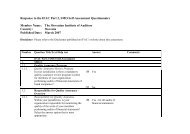
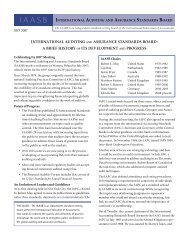
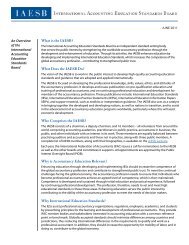
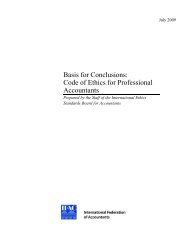
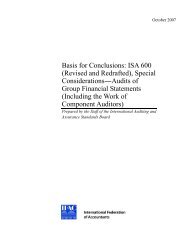
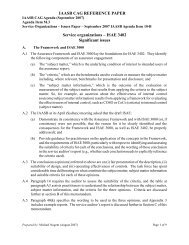
![International Auditing and Assurance Standards Board [IAASB] - IFAC](https://img.yumpu.com/22522144/1/190x245/international-auditing-and-assurance-standards-board-iaasb-ifac.jpg?quality=85)
